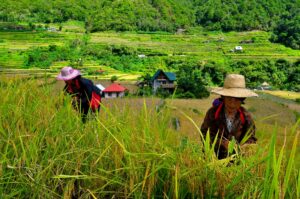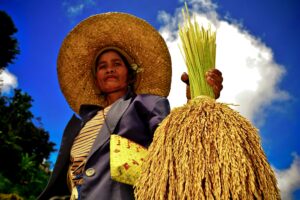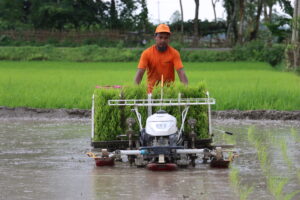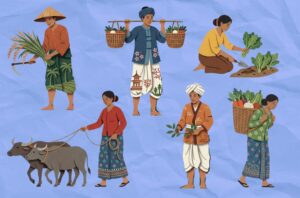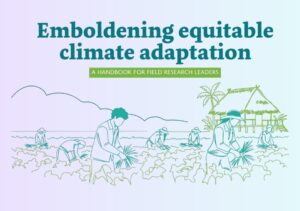Rising fertilizer prices and misperceptions about environmental degradation in intensive agriculture have stimulated claims that so-called “low-input” technologies relying on organic nutrient sources may provide a more sustainable means of producing food crops and increasing farmers’ income. However, the sole use of organic technologies would likely perpetuate food insecurity and poverty in Asia because they are typically an expensive source of essential nutrients and confer few if any benefits in terms of sustainability and the environment.
The effects of organic matter applications on soil quality and crop yields become clear only after several years of continuous applications. Numerous long-term experiments conducted in a wide range of ricebased cropping systems have demonstrated that the continuous use of organic amendments, at affordable rates, does not lead to signifi cant yield advantages compared with systems that are managed with judicious and balanced use of mineral fertilizers.
Organic practices can result in nutrient imbalances (both excesses and deficiencies). Short-term yield reductions are common and organic agricultural systems appear to require both premium prices and government subsidies to remain economically viable on a large scale. They also require large amounts of organic nitrogen (N) sources or diversion of land to accommodate rotations with leguminous crops (green manures) that can capture atmospheric nitrogen.
Diverting land to grow nonfood or low-yielding leguminous crops reduces food production. This may be feasible in some industrialized countries, but, in developing countries with high population densities and limited agricultural land, it can threaten national food security and poverty reduction by leading to higher food prices. Moreover, recent research suggests that there are no proven environmental benefits in organic systems, such as less N leaching or lower gaseous-N losses, when the environmental impact is expressed on a per ton food-produced basis.
In all cropping systems, nutrients are constantly removed in the form of crops harvested. If these nutrients are not returned, the system cannot be sustainable without further input from outside. Organically managed systems are no exception to this rule. Organic fertilizers produced within the boundaries of a farm do not add nutrients to the cropping system as a whole; rather, they transfer nutrients within the system. In contrast, mineral fertilizers add nutrients to the system. In most low-input systems that rely on organic sources, the nutrient content and quantity of available organic fertilizers are insuffi cient to achieve high yields for most crops.
Irrigated rice, with its flooded fields, is the only major food crop that can achieve stable yields with up to three harvests annually, without the need for rotation, for decades. Unique features of carbon and nitrogen cycling in submerged soil mean that soil organic matter actually tends to accumulate in such systems, even if no manure is applied or much of the rice straw is removed from the field. In such systems, applying organic matter in addition to crop residues has relatively less benefi t for either crop productivity or the sustainability of the overall cropping system.
Because the environmental and sustainability benefi ts of organic fertilizer in rice production are small or nonexistent, use of organics should be governed by profi tability. But the nutrient content of organic fertilizer is typically low and much more variable than that of inorganic fertilizer, necessitating large quantities. Thus, if organic fertilizer needs to be transported over a long distance, costs can be prohibitively high. Further, given organic fertilizer’s variable nutrient content, farmers often have trouble judging how much to apply. With inorganic fertilizer, farmers are relatively sure of the nutrient quantities and can more easily adjust nutrient rates and proportions to match site-specific needs.
When manure or other organic materials are readily available, rice farmers should apply them as part of their overall management strategy. For example, applying organics in a primitive production system that does not use mineral fertilizers will probably increase profi ts and food production. But, most Asian rice farmers already use mineral fertilizer, so higher profi ts are likely only if organics are used to supplement—not replace—conventional inorganic fertilizers.
Many commercially produced organic fertilizers that are widely promoted and even subsidized in rice-growing countries of Asia do not provide proven profi table yield gains. Although high fertilizer prices have added additional pressure to farmers and policymakers alike, governments should limit subsidies and invest instead in technologies that, coupled with appropriate supporting policies, enable farmers to improve yields and fertilizer efficiency in their fields.
_________________________________________
Dr. Dobermann is deputy director general for research at IRRI. Dr. Dawe is a senior economist at the United Nations Food and Agriculture Organization. The views expressed do not necessarily represent official positions of the authors’ organizations.

